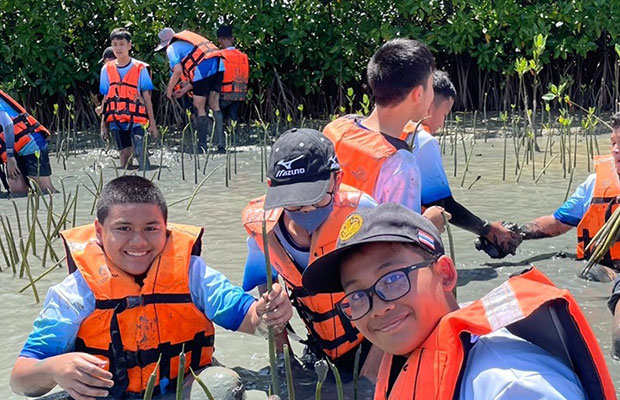
Caring for Our Common Home
The details may differ, but the story is the same. In Thailand, just like most places around the world, global economics often conflict with environmental health. That’s why students at the Salesian Saengthong Vitthaya School are learning new ways to restore nature’s balance.
Saengthong Vitthaya School is located in the Songkhla Province, a coastal area bordering the Gulf of Thailand. Here, mangrove forests are vitally important to the local and national ecosystem. They are uniquely effective at storing carbon; mitigating the effects of greenhouse gas emissions; enriching the soil; and protecting against erosion.
“At the same time, their prime location means these wetlands are vulnerable to deforestation,” explains Father Michael Conway, director of Salesian Missions. “That’s because developers want to make room for resorts, hotels and other projects.”
The global shrimp farming industry, which generates substantial income in Thailand, also contributes to mangrove destruction. Not only do companies cut down mangrove trees to create shrimp pools, but certain industrialized processes—including the use of antibiotics and pesticides—pollute the forests, too.
“It’s a pity that at present, mangrove forests throughout Thailand have been destroyed for various reasons,” observes one Salesian missionary at the school. He notes that the country’s total area of mangroves has declined from over 905,000 acres in 1961 to around 684,000 acres today. That’s a significant loss of 25%.
Regenerating the vegetation is critical to these vital mangroves and Salesian educators in Thailand believe that everyone has a role to play.
In June, 54 8th-graders from Saengthong Vitthaya School set out with their teachers and parent volunteers to plant new mangrove trees and release baby crabs at the local Mangrove Forest Conservation Club.
“We came together to bring about good for the environment on a larger scale,” says the missionary. “When we plant trees in these coastal areas, they help reduce soil degradation, minimize erosion, and improve the air quality in the region.”
Further, he explains, “having Salesian youth participate in mangrove planting activities and releasing baby crabs is another form of training to make them aware of their duty to jointly care for the earth and the environment.”
Learn more about our work in Thailand.
Our mission incorporates environmental awareness into the Salesian curriculum and teaches youth to be thoughtful stewards of the environment. What’s your mission?

